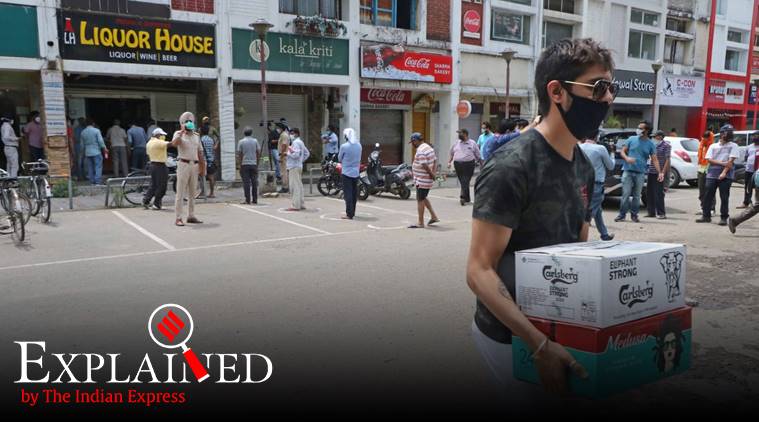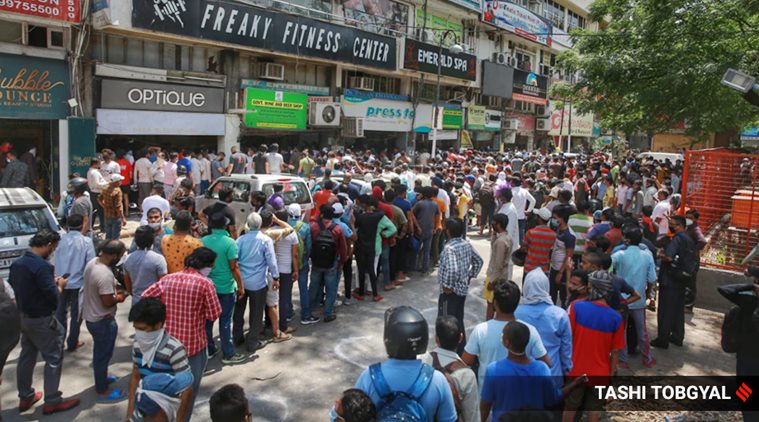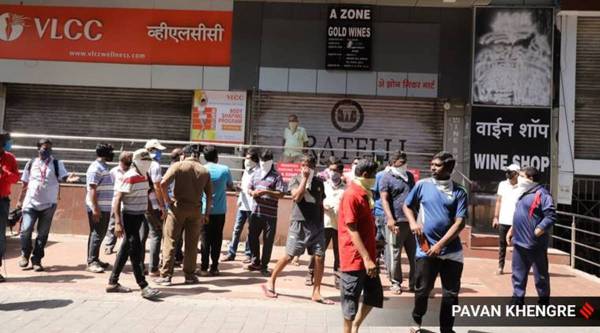- India
- International
Explained: Why liquor sales matter to states
Queues after easing of restrictions, and a price hike in Delhi, are pointers to the importance of liquor as a source of revenue. How does liquor contribute to states' coffers, and which state earns how much?
 Outside a liquor store in Chandigarh on Monday. States eased restrictions to allow alcohol stories to open amid the Covid-19 outbreak, following directions from the Centre. (Express Photo: Kamleshwar Singh)
Outside a liquor store in Chandigarh on Monday. States eased restrictions to allow alcohol stories to open amid the Covid-19 outbreak, following directions from the Centre. (Express Photo: Kamleshwar Singh)
Following the easing of restrictions in the third phase of the nationwide lockdown, some of the most striking images on Monday showed long queues outside liquor stores around the country. By the evening, the Delhi government announced a 70% hike in the price of liquor across categories in the capital, starting Tuesday. Delhi’s “special corona fee” on alcohol underlines the importance of liquor to the economy of the states.
Manufacture and sale of liquor is one of the major sources of their revenue, and the reopening comes at a time when the states have been struggling to fill their coffers amid the disruption on account of the lockdown.
Coronavirus lockdown: How do states earn from liquor?
Liquor contributes a considerable amount to the exchequers of all states and Union Territories except Gujarat and Bihar, both of which have enforced prohibition. Generally, states levy excise duty on manufacture and sale of liquor. Some states, for example Tamil Nadu, also impose VAT (value added tax). States also charge special fees on imported foreign liquor; transport fee; and label & brand registration charges. A few states, such as Uttar Pradesh, have imposed a “special duty on liquor” to collect funds for special purposes, such as maintenance of stray cattle.
A report published by the Reserve Bank of India last September (‘State Finances: A Study of Budgets of 2019-20’) shows that state excise duty on alcohol accounts for around 10-15 per cent of Own Tax Revenue of a majority of states. In fact, state excise duties on liquor is the second or third largest contributor to the category State’s Own Tax revenue; sales tax (now GST) is the largest. This is the reason states have always wanted liquor kept out of the purview of GST.
 Outside a liquor store in New Delhi on Monday. (Express Photo: Tashi Tobgyal)
Outside a liquor store in New Delhi on Monday. (Express Photo: Tashi Tobgyal)
How much do the state governments earn from excise on liquor?
The RBI report shows that during 2019-20, the 29 states and the UTs of Delhi and Puducherry had budgeted a combined Rs 1,75,501.42 crore from state excise on liquor. This was 16% higher than the Rs 1,50,657.95 crore they had collected during 2018-19.

On an average, the states collected about Rs 12,500 crore per month from excise on liquor in 2018-19, which rose to about Rs 15,000 crore per month in 2019-20, and which was further expected to cross Rs 15,000 crore per month in the current financial year. This projection was before the COVID-19 outbreak.
“Uttar Pradesh collected a monthly average amount of Rs 2,500 crore from liquor in the last financial year and we hope get about Rs 3,000 crore in the current financial year,” said a top official with the UP government.
 Source: State Finances, A Study of Budgets of 2019-20; RBI
Source: State Finances, A Study of Budgets of 2019-20; RBI
Which states collect the highest amounts in this form of revenue?
There is a time lag in the compilation of revenue data from the states, so full-year figures are available only up to 2018-19. During that financial year, the five states that collected the highest revenue from excise duty on liquor were Uttar Pradesh (Rs 25,100 crore), Karnataka (Rs 19,750 crore), Maharashtra (Rs 15,343.08 crore), West Bengal (Rs 10,554.36 crore) and Telangana (Rs 10,313.68 crore). For amounts collected as VAT and special fees on import for foreign liquor, state-wise figures are not available.
One reason why UP collects the highest is that it levies only excise duty on manufacture and sale of liquor. It does not collect VAT separately, unlike states such as Tamil Nadu, whose VAT collections do not reflect in the excise duty collections.
With Bihar and Gujarat having prohibited liquor, Bihar had ‘nil’ revenue from liquor in 2018-19 and 2019-20, while Gujarat’s liquor revenue was negligible. Andhra Pradesh too announced prohibition last year; however, sale of the liquor has been allowed with “prohibition tax” from Monday.
 In Pune, on Monday. (Express Photo: Pawan Khengre)
In Pune, on Monday. (Express Photo: Pawan Khengre)
What exactly is state excise?
State excise is levied mainly on liquor and other alcohol-based items. Revenue receipts from state excise come mainly from commodities such as Country Spirits; Country Fermented Liquors; Malt Liquor; Liquor; Foreign Liquors and Spirits; Commercial and Denatured Spirits and Medicated Wines; Medicinal and Toilet Preparations containing Alcohol, Opium etc; Opium, Hemp and other Drugs; Indian Made Foreign Liquors; Spirits, and Sales to Canteen Stores Depots. Besides, a substantial amount comes from licences, fine and confiscation of alcohol products.
What are the other sources of revenue for the states?
The states’ revenues comprise broadly two categories — Tax Revenue and Non-Tax Revenue. Tax revenue is divided into two further categories: State’s Own Tax Revenue, and Share in Central Taxes. Again, Own Tax Revenue comprises three principal sources: Taxes on Income (agricultural income tax and taxes on professions, trades, callings and employment); Taxes on Property and Capital Transactions (land revenue, stamps and registration fees, urban immovable property tax); and Taxes on Commodities and Services (sales tax, state sales tax/VAT, central sales tax, surcharge on sales tax, receipts of turnover tax, other receipts, state excise, taxes on vehicles, taxes on goods and passengers, taxes and duties on electricity, entertainment tax, state GST, and “other taxes and duties”).
Don’t miss from Explained | Domestic helps are allowed at your home from today. And your RWAs cannot stop them legally. Here’s why
According to the RBI report, in 2019-20, state GST had the highest share, 43.5%, in states’ Own Tax Revenue, followed by Sale Tax at 23.5% (mainly on petroleum products which are out of GST), state excise at 12.5%, and taxes on property and capital transactions at 11.3%.
More Explained
EXPRESS OPINION
Apr 26: Latest News
- 01
- 02
- 03
- 04
- 05











































